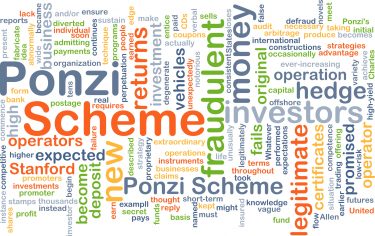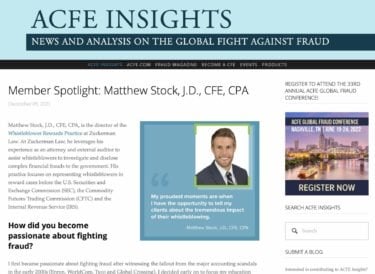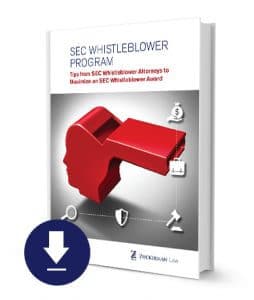
Whistleblower Awards for Exposing Fraud at Hedge Funds
 Under the SEC Whistleblower Program, whistleblowers are eligible for monetary awards when they provide the SEC with original information about violations of federal securities laws, including hedge fund fraud. Whistleblowers can receive between 10% and 30% of the monetary sanctions collected if their tip leads to a successful enforcement action resulting in monetary sanctions exceeding $1 million. A whistleblower can submit a tip anonymously to the SEC if represented by counsel.
Under the SEC Whistleblower Program, whistleblowers are eligible for monetary awards when they provide the SEC with original information about violations of federal securities laws, including hedge fund fraud. Whistleblowers can receive between 10% and 30% of the monetary sanctions collected if their tip leads to a successful enforcement action resulting in monetary sanctions exceeding $1 million. A whistleblower can submit a tip anonymously to the SEC if represented by counsel.
Since 2012, the SEC Whistleblower Office has issued nearly $1.3 billion in awards to whistleblowers. The largest SEC whistleblower awards to date are $114 million and $50 million. Our firm has secured multi-million dollar awards for SEC whistleblowers.
While hedge funds are not required to abide by all of the strict regulations that apply to mutual funds, hedge funds are still subject to the same prohibitions against fraud as are other market participants.
If you have information that may qualify for an SEC whistleblower award, contact the Director of our SEC whistleblower practice at [email protected] or call our leading SEC whistleblower lawyers at (202) 930-5901 or (202) 262-8959. All inquiries are confidential.






In conjunction with our courageous clients, we have helped the SEC halt multi-million dollar investment schemes, expose violations at large publicly traded companies and return funds to defrauded investors. Read our tips for SEC whistleblowers and Forbes column about the success of the SEC whistleblower program. Click below to hear SEC whistleblower lawyer Matt Stock’s tips for SEC whistleblowers:
Recently the Association of Certified Fraud Examiners published a profile of Matt Stock’s success working with whistleblowers to fight fraud:
Contact us today to find out the strategies that we have successfully employed to secure SEC whistleblower awards for our whistleblower clients.
Hedge Funds

Moreover, certain federal and state laws that apply to mutual funds do not apply to hedge funds. For example, the SEC notes that “hedge funds are not required to provide the same level of disclosure as you would receive from mutual funds. Without the disclosures that the securities laws require for most mutual funds, it can be more difficult to fully evaluate the terms of an investment in a hedge fund. It may also be difficult to verify representations you receive from a hedge fund.”
As noted by SEC Chair Gensler in a recent speech, U.S. private funds are growing in size and complexity and represent a critical portion of U.S. capital markets. They have gross assets under management of $17 trillion with net assets of $11.5 trillion. Hedge funds have gross assets of at least $8.8 trillion and net assets valued at about $4.7 trillion.
Examples of Hedge Fund Violations
Notable areas of hedge fund fraud that may qualify for an SEC whistleblower award include:
- Material Misrepresentations to Investors;
- Misappropriation of Investor Funds/Ponzi Schemes;
- Insider Trading; and
- Inaccurate disclosures in Form PF.
See below for examples of SEC enforcement actions brought against hedge funds for these violations.
SEC Actions Combatting Hedge Fund Fraud
Material Misrepresentations to Investors

• SEC v. Beacon Hill Asset Management Company: The SEC charged hedge fund Beacon Hill and its four principals for implementing a fraudulent scheme that resulted in investors losing more than $300 million. According to the SEC’s complaint, the hedge fund’s principals made several material misrepresentations to investors, including: (1) the methodology it used for calculating the net asset values of the hedge funds it managed; (2) its hedging and trading strategy; and (3) how it valued the performance of the funds. In addition, the SEC alleged the hedge fund manipulated its valuation procedures to show steady and positive returns.
• SEC v. Charles L. Harris, Tradewinds International L.L.C. and Tradewinds international II L.P.: The SEC charged hedge fund Tradewinds International with fraudulently raising $10 million from at least 30 investors by misrepresenting the fund’s past rates of return, net asset value and the use of investor funds. According to the SEC’s complaint, the hedge fund manager, Charles L. Harris, told investors that Tradewinds’ net asset value was between $18 and $23 million, when in reality it was approximately $30,000. Harris was sentenced to 168 months in prison and was ordered to pay restitution of $13.8 million.
• In the Matter of Global Infrastructure Management, LLC On December 20, 2021, the SEC charged Global Infrastructure Management, LLC for failing to properly offset management fees and for making misleading statements about the fees and expenses it charged. Global agreed to pay a $4.5 million penalty to settle the SEC charges and repaid $5.4 million to its affected private fund clients.
• SEC Investigates Statim Holdings Inc.: The SEC is currently investigating Statim Holdings Inc., an Atlanta-based firm that has allegedly guaranteed positive returns to investors in its main hedge fund. Note: To date, the firm has not been accused of any wrongdoing and an investigation doesn’t mean they will face legal action.
Misappropriation of Funds and Ponzi Schemes

• SEC v. Yasuna Murakami. MC2 Capital Management, LLC: On May 22, 2017, the SEC charged a Massachusetts-based hedge fund manager, Yasuna Murakami, with making “Ponzi-like payments and taking investor funds to pay for personal travel, meals, and credit card bills.” According to the SEC’s complaint, Murakami misappropriated more than $8 million for business and personal expenses and made approximately $1.3 million in Ponzi-like payments to earlier investors as purported investment gains. The enforcement action led to at least $10 million in monetary sanctions.
Insider Trading
Hedge funds are liable for insider trading violations when they buy or sell a security in breach of a fiduciary duty or other relationship of trust and confidence, while in possession of material, nonpublic information about the security.
• SEC v. S.A.C. Capital Advisors: In March 2013, hedge fund advisory firm CR Intrinsic Investors – an affiliate of S.A.C. Capital – agreed to pay more than $600 million for allegedly participating in an insider trading scheme involving a clinical trial for an Alzheimer’s drug being developed by a pharmaceutical company. According to the SEC’s complaint, two of the firm’s portfolio managers, Mathew Martoma and Michael Steinberg, illegally obtained confidential information about the clinical trial’s negative results about two weeks before they were made public. The portfolio managers then tipped off several hedge funds about the negative results. In a little more than a week, several hedge funds sold nearly $1 billion of the pharmaceutical company’s stock.
The hedge funds earned profits and avoided losses of more than $275 million as a result of the illegal trades. Martoma was rewarded with a $9 million bonus for his work.
Protections for Hedge Fund SEC Whistleblowers

Whistleblowers may file a tip with the SEC anonymously if they are represented by an attorney.
The anti-retaliation provision of the Sarbanes-Oxley Act provides robust protection for corporate whistleblowers. To learn more about corporate whistleblower rights, download our guide Sarbanes-Oxley Whistleblower Protection: Robust Protection for Corporate Whistleblowers.
Protections for Hedge Fund Whistleblowers
Click here to learn more about anti-retaliation protections for SEC whistleblowers under the Dodd-Frank Act and Sarbanes-Oxley Act.
Experienced SEC Whistleblower Attorneys
To learn more about the SEC Whistleblower Program, download Zuckerman Law’s eBook: SEC Whistleblower Program: Tips from SEC Whistleblower Attorneys to Maximize an SEC Whistleblower Award:
For more information about whistleblower rewards and bounties, contact the SEC whistleblower lawyers at Zuckerman Law for a free, confidential consultation at 202-262-8959.
See our column in Forbes: One Billion Reasons Why The SEC Whistleblower-Reward Program Is Effective
See our column in Going Concern: Sarbanes-Oxley 15 Years Later: Accountants Need to Speak Up Now More Than Ever
U.S. News and Best Lawyers® have named Zuckerman Law a Tier 1 firm in Litigation – Labor and Employment in the Washington DC metropolitan area in the 2018 edition “Best Law Firms.” In 2017, Washingtonian magazine named two of our attorneys top whistleblower lawyers.








